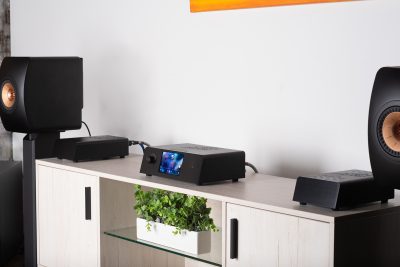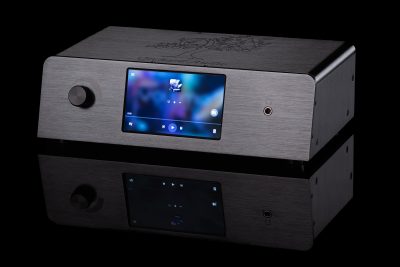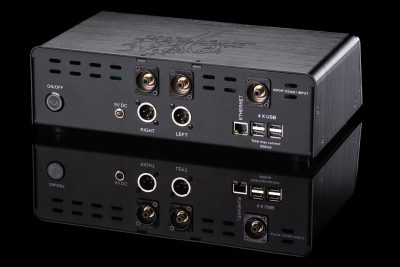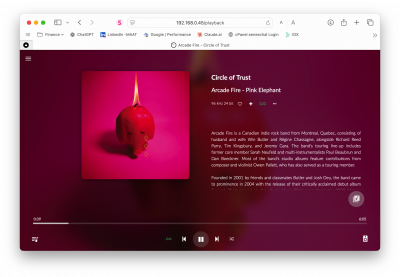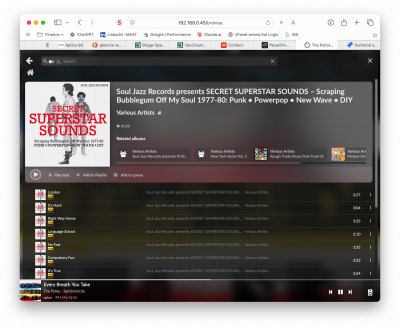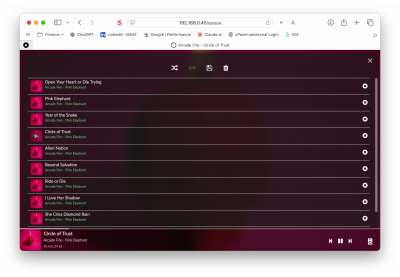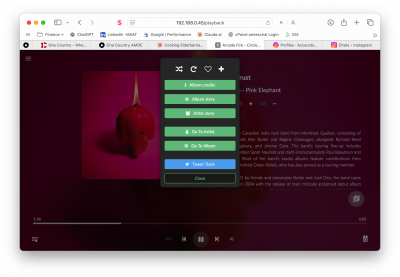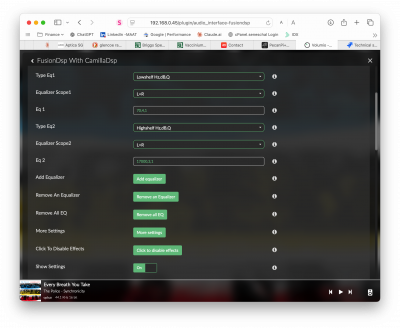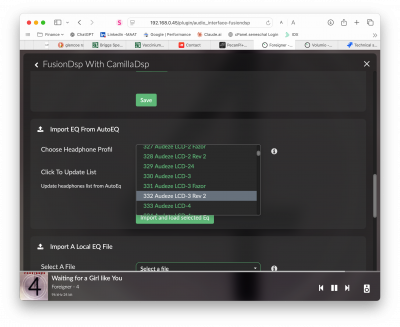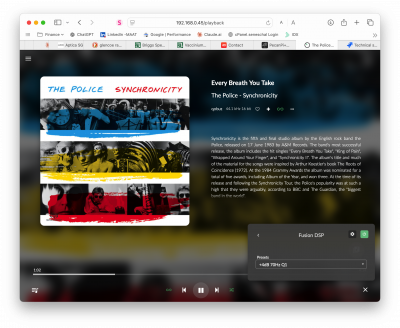Orchard Audio PecanPi+ Streamer Premium
“Streamers,” those lifestyle-class, modern source appliances, are thick on the ground these days. Ranging in price from less than $200 to many, many thousands, they offer all levels of sophistication in sound quality, packaging, and UI refinement. Orchard Audio, better known for their Starkrimson family of GaN FET Class D power amps, has brought their own technical chops to bear, resulting in the PecanPi+ Streamer Premium. The only non-amplifier member of their more upscale collection of “Premium”-branded products, the PecanPi+ floats comfortably in the middle of the streamer ocean.
Curious about the overall product design, I popped the hood to look inside the enclosure. There I found two circuit boards; a Raspberry Pi SBC (single board computer), which you may remember from John’s “RPi” explorations elsewhere on this site. That second board handles digital–to–analog conversion. Owner and Chief Everything Officer Leonid “Leo” Ayzenshtat told me, via e-mail, that the Raspberry Pi, “…handles everything except for the DAC portion.” The RPi takes care of the local network connection, plus runs the Volumio operating system along with the user interface. He considers his special sauce to be in his realization of the DAC board:
- Re-clocking circuitry
- Proprietary reconstruction filter using
low noise Panasonic resistors and Texas Instruments (TI) OPA1612 op-amps - Paralleled TI OPA1622s as headphone drivers
- Ultra-low noise linear regulators for all analog circuits
The linear regulators include:
- LT3045 (0.8uV noise) for the positive op-amp power supply
- LT3090 (18uV noise) for the negative op-amp power supply
- LT3042 (0.8uV noise) for the digital-to-analog converter chips
The re-clocking addresses jitter created by the RPi using an ultra-low phase noise clock based on the Crystek CCHD-575 monolithic oscillator. The CCHD-575 typically exhibits phase jitter of 82fsRMS at 100 MHz. Sharp eyed readers may know that item number three in the above list reveals one of Ayzenshtat’s not-so-secret hacks for great sound at reasonable cost. His use of paralleled OPA1622 op-amps for driving headphones is also what he uses in his fancy headphone power amp, the Valencia.
I asked Leo a question that’s fundamental for me: Other than the casework, what makes his product different from Volumio’s own hardware offering, specifically the Rivo Plus streamer. His answer was terse and to the point, “The DAC is what differentiates it.” He elaborated that the “…DAC board is where my expertise comes in. I put my own spin on the implementation of the AK4499EX.” The AK4499 is Asahi Kasei Microdevices’ (AKM) flagship VELVET SOUND™ AK4499EXEQ multi-bit, switched resistor DAC chip. As with all DAC integrated circuits, the resulting sound of any product that incorporates it will be heavily dependent on the implementation – what components are wrapped around it, how the product designer lays out the circuit board, and how the power supplies and clocks are designed and fed to the chip.
Orchard’s not just about amplifiers. The PecanPi+ is their premium solution to high fidelity streaming at a reasonable price. For those of you who care about such things, the PecanPi+ Streamer Premium uses a digital volume control. I bring this up to dispel a rumor I hear often, that analog volume controls are somehow better. As my colleague Stuart Yaniger reminded me, with an analog volume control, the S/N ratio degrades as attenuation increases. Also, “…digital controls (don’t) have Johnson noise.” While digital exhibits perfect left-to-right tracking at any attenuation setting, that’s not the case with analog potentiometers. That said, far more costly switched resistor or inductive attenuators can be designed for high L/R tracking accuracy at any setting. As with everything else in audio, fidelity is a function of the designer’s chops and budget.
I started my listening by busting out my lowest cost but still exceptional DAC+HPA, the Clarus CODA by Gordon J. Technologies, paired with my most neutral, current-generation Audeze LCD-3 cans tethered with Wireworld Nano-Platinum Eclipse cabling. Playing the same Qobuz tracks, it took only a few minutes of listening to notice that the PecanPi+ delivered better transient response, a wider soundstage, more impactful slam and deeper, cleaner bass. This is not a condemnation of the CODA, it’s simply a fact that the CODA is a flash drive-sized, $300 product. The CODA is the best dongle-style DAC+HPA I’ve heard, being in a class by itself when compared to those lame DragonFly products that have so many ad dollars behind them. Still, I thought it a good place to start.
Once I had a performance baseline, I proceeded on to a nice component stack, albeit still at a lower price. That stack was Cambridge Audio’s MXN10 streamer (originally $499) plus their $249 DacMagic 100 converter, married together digitally with my trusty ANTICABLES Level 6.2 ABSOLUTE RCA interconnect via AES3 unbalanced. That Level 6.2 is an analog cable but, at only 6″ in length, at least there’s less of it. I was pleasantly surprised to hear that the Cambridge Audio stack did a fine job. A slight upper bass soft thickness combined with a slightly rolled off top end gave a more romantic view into what the PecanPi+ portrayed with what I think of as more honesty. For an appropriate simile, I’d tell you that the little Cambridge Audio component stack offered a chewy, Old Skool Brit vibe. I love pecan pie, but I can tell you the PecanPi+ was not chewy. Instead, it was more open at the top and more precise at the bottom. The midrange was more in line as well, with better verisimilitude.
Playing a hunch, I cracked open the attaché case containing my Meze Empyrean open backs. The Empyrean is already a romantic set of cans, and the PecanPi+ and the Meze slant made for a magical pairing. I was autoplaying through my Qobuz public playlist titled OMaso_Test, over 150 songs deep, and soon landed on two adjacent but quite different tracks: Caroline Spence’s Americana raveup What You Don’t Know from Mint Condition [Qobuz 96k 2019 Rounder] followed by Enrico Pieranunzi’s super chill, jazzy Bluemantique from Monsieur Claude (A Travel with Claude Debussy) [Qobuz 88.2k 2018 Bonsaï]. The Orchard+Meze combo brought the weight and silkiness from the cans and the air, articulation and stout bottom of the PecanPi+. Through the British stack, I felt something was missing, especially at the top. Mind you, I love the MXN10 + DacMagic100, especially as an exemplary entry level desktop set but we’re talking $400 + 250 versus a much higher $1,500 for the PecanPi+.
Other than superior fidelity, what else do you get for that extra $850? First, the Orchard Audio streamer is an integrated product; an all-in-one. One relatively compact chassis and set of controls versus two boxes with lots of buttons. The touch screen on the front of the PecanPi+ is quite usable, so much so that I disabled the option to display Volumio’s Linux cursor. Not only did I not need to see that UI feature because the OS responded swiftly and reliably, but its absence made the experience feel more appliance-like which, in this case, was mo’ betta. In keeping with the appliance…. er, the lifestyle approach, the web remote is optional. It provides more control but isn’t strictly necessary and frankly, my phone or iPad are not superglued to my hand so I appreciate being able to walk up to the rack to drive the musical selection around and twiddle the gain knob when in a tactile mood.
On the other hand, the component approach includes unbalanced analog outs, a lower cost I/O approach relative to balanced XLR interconnects. The stack also supports networking via copper and Wi-Fi whereas the PecanPi+ has only a wired Ethernet input. For my listening comparisons, I stuck exclusively with the hardwired approach. By the way, for this review I didn’t press any audiophile networking hardware into service. While on the subject of audiophile accessories, I should mention the included power supply. My PecanPi+ included iFi’s white iPowerX 9V power supply, a low noise, “wall wart” PSU with active noise cancelling that can’t help but improve the fidelity of this excellent streamer.
As I mentioned, the PecanPi+ is running Volumio OS, a Linux fork. My idiot savant cyber-buddy, Claude, responded when asked that, “Volumio is based on Debian, specifically using a customized version of Debian Linux†. It’s a Linux distribution specifically designed for music playback and audio streaming, optimized for single-board computers like Raspberry Pi and other audio-specific hardware platforms. The Debian base provides Volumio with a stable and reliable foundation for its audio-focused operating system.” Volumio OS is FOSS or Free & Open Source, and has been around about a decade. Now at version 3.795, released in February of this year, the first check in on Github appeared in February of 2014. The current version used by Orchard supports multi-room endpoint grouping, plus you can output your music to Sonos and Chromecast (blech) devices or control and listen to any Volumio music source on your local network.
After having the PecanPi+ plugged into my network supplying streaming music, I attached a clone of my music library into one of the four USB Standard-A spigots on the back. Without further ado, the contents appeared in the Music Library choice on the Home page. My library is overwhelmingly composed of ALAC for LPCM (Linear PCM) and DFF for DSD. Using the web interface, the PecanPi+ immediately opened the library of files and presented the contents to me without foreground indexing… lovely! As I traversed the directory tree of almost 1900 albums, the Pi remembered where I was, parent directory-wise, so I could easily find my way around. Enabling the “SuperSearch” feature did cause the whole beastie to grind to a halt, although it continued to play a DFF direct transfer from the master tape of the Police’s Reggatta de Blanc I already had playing. Although I can’t confirm that SuperSearch was the culprit, I’d suggest enabling that feature then walking away for a while.
In the spirit of Linux, it supports 3rd party plug–ins to add functionality. I experimented with the FusionDSP plug–in that came with my distribution. It was, to say the least, awkward to define equalizer presets. Pulling filter settings out of thin air requires either a good deal of prior experience, or lots of trial and error!
I was fortunate to have Wattson Audio’s $4995 Madison LE streamer in for review while I wrote this. At twice the price, the Madison LE is certainly more refined, with truer tone, less audible congestion, and a deeper soundstage. That said, doubling the price did not, in fact, double the quality. For me and my audio geek buddies, the Madison LE offered a clearly audible advantage but, without a direct comparison, I doubt most folks would have a beef with anything sound-wise from the Orchard Audio piece.
The PecanPi+ is about the same price as Bluesound’s NODE ICON, and the PecanPi+ offers about the same step size in sound quality compared to the ICON as going from the Pi to the Madison LE. What that tells me is that Orchard Audio has paid better attention to those design factors that affect final fidelity, rather than relying on fancy packaging and building their own rather clumsy operating system as Bluesound has done. Ayzenshtat cleverly let the Volumio team do the heavy lifting for an operating system, so he could concentrate on the audio path. Given that he’s one guy compared to who knows how many bodies on the BluOS team says a lot to me about working smarter and not letting the marketing team drive a product’s development.
Orchard Audio’s PecanPi+ Premium is not the cheapest streamer/DAC on the market. If you are cost-constrained, I can highly recommend LinkPlay’s WiiM family of streamers. I own a WiiM amp and it’s astounding how much value is embodied in that product. However, if you have a more expansive budget, then I would be amiss if I didn’t steer you toward a dedicated listen to the PecanPi+. It combines maximum musicality along with technical polish for exceptional sound for its price range. As a bonus, it’s easy to use and will provide countless hours of musical enjoyment. I loved it!
PecanPi+ Streamer Premium — $1,499.95
Orchard Audio
Succasunna NJ 07876
+1 (504) 233-3444
† — For those who care about such things, the Volumio log file revealed that my particular release was an Arm build of “…Linux version 6.1.69-v7+”
